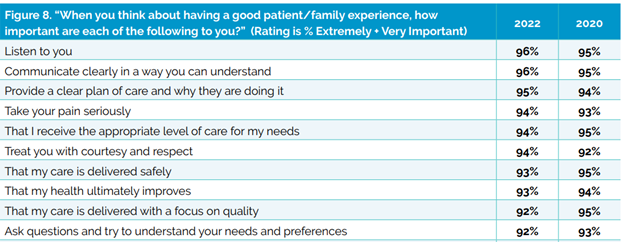Over the last few years in healthcare, we have seen unprecedented worker shortages, burnout, and supply chain issues. To say it’s been a challenging time for healthcare providers would be an understatement and the most recent survey on patient experience from The Beryl Institute and Ipsos reveals that it’s been a challenging time for patients as well. The survey found that consumers’ perception of quality of healthcare has fallen 6 percentage points to its lowest point since they first began tracking.
We don’t necessarily see this figure as an inevitable trend, but rather as an opportunity to course correct, and with that in mind, we wanted to explore the results of the report to provide some specific insights into what people value in their healthcare experiences and what influences their perceptions of quality.
The survey polled 1000 adults in the United States to determine:
- How they rate the quality of their healthcare in the US
- How they would rate their experiences in healthcare over the last year
- How important it is to them to have a good patient experience
- Why having a good patient experience is important to them
- What healthcare issues are most important to them
The survey revealed that having a positive experience is still of utmost importance to patients with 92% of respondents stating that it is extremely or very important to them. Patients’ perception of healthcare quality is declining, however, with only 64% of patients ranking their latest healthcare experiences as good or very good. As a result, the survey found that the most common actions consumers would take given a good or bad experience, is to tell someone about it (44%). In the case of a bad experience, 39% of people said they would leave their provider.
When patients were asked which healthcare issues are most important to them, the issues that ranked as least important were related primarily to environmental factors such as how they access medical information, parking, and up-to-date facilities. Safety and quality made up some of the top responses, but there were 2 strong themes that underpinned the top 10 responses that we wanted to expand on:
1) Patients want a commitment to clear, consistent communication
2) Trust is essential to healthcare experiences
Prioritizing patient communication
The following chart shows the top responses of what healthcare issues are most important to patients. Interestingly, what we see as a consistent theme is that the items of highest value were related to how patients are made to feel, specifically as it relates to communication.
[Link to see full chart]
Source: The Beryl Institute - Ipsos PX Pulse Consumer Perspectives on Patient Experience in the U.S, Nov. 2022.
The items of greatest importance to patients are not high-cost, big investment items, but rather the expectations that patients have of the individuals who provide their healthcare experience. Behaviours such as listening, asking questions, communicating clearly, having a clear plan, and treating patients with courtesy and respect are all human behaviors that form the foundation of trust between patients and providers.
Building trust, human to human
Healthcare experiences between patients and providers take place when patients are their most vulnerable, which makes trust absolutely essential to those interactions. In a previous blog, we shared the results of the Accenture report which revealed that trust is the most powerful predictor of patient loyalty, with a lack of trust being the main reason that patients switch providers.
90% of consumers saw trust as "Extremely important" or "Very important".
This theme was echoed again in this report with almost 90% of consumers seeing trust as “Extremely important” or “Very important.” The survey also revealed that over the last 2 years, patient trust in healthcare has been faltering with 68% of respondents reporting that their trust in healthcare has declined.
Looking at this trend and considering the human behaviours that patients value most, we can see that patients feel they are missing some key pieces of those person-to-person interactions in their latest healthcare experiences. Given the staffing and budgetary challenges faced by healthcare providers, we also know that adding more staff to ensure patients have those positive personal interactions is not so simple, and that’s where technology comes in.
How technology helps us provide human experiences
Increasing the use of technology may seem like a counter-intuitive way to improve communications and increase trust, but it really is the best way to do it efficiently. Patient engagement technology can allow practices to easily deliver consistent, clear, and helpful communications at just the right time throughout an episode of care, ensuring that patients feel well-supported from referral to recovery.
Patient engagement platforms can also offer features such as chat or video with options so that patients and providers have easier, faster options for when patients have quick questions during a care episode. These platforms can also automate the collection of progress reports, pain surveys, and patient experience feedback from patients so that communication feels like a 2-way street with their progress being monitored along the way.
The Beryl Institute report does a good job of highlighting that at its core, high-quality healthcare is about humans helping humans. It’s clear, though, that the more time we have for that, which is something that patient engagement technologies provide, the better for providers and the better for patients.

